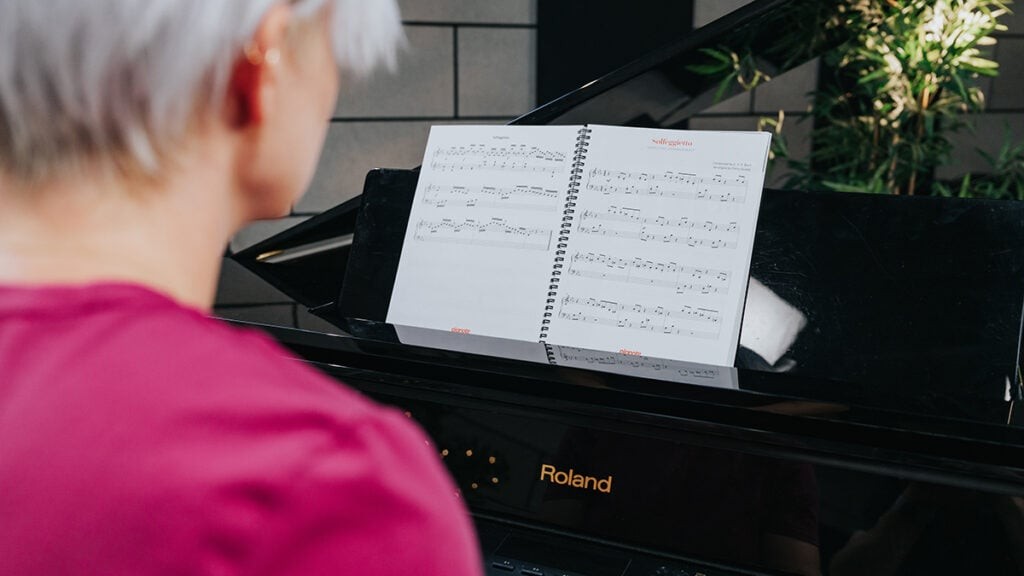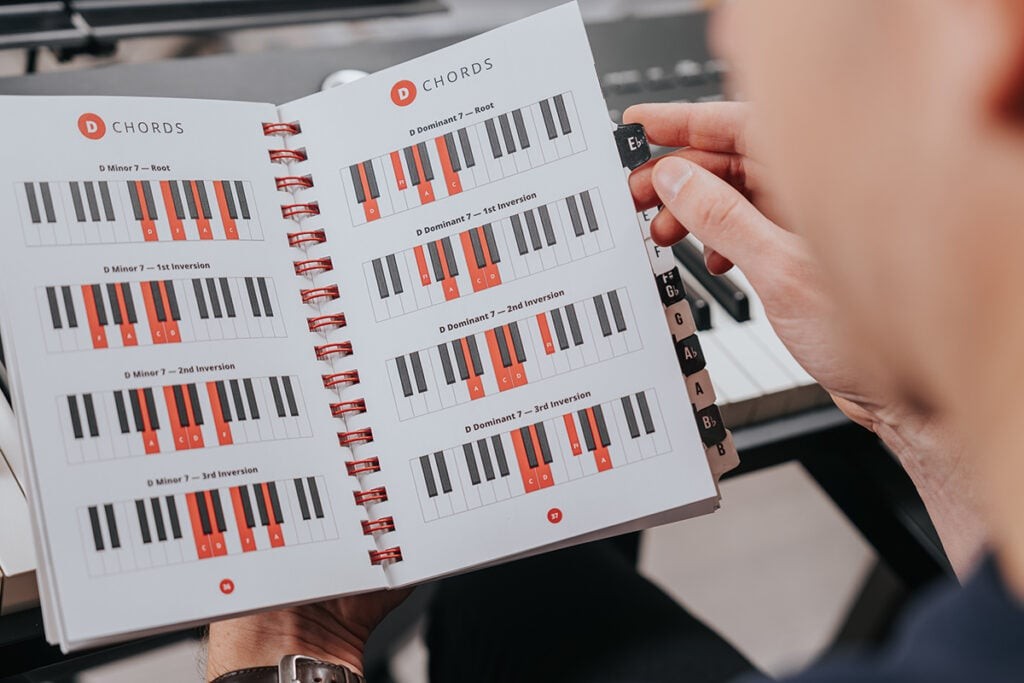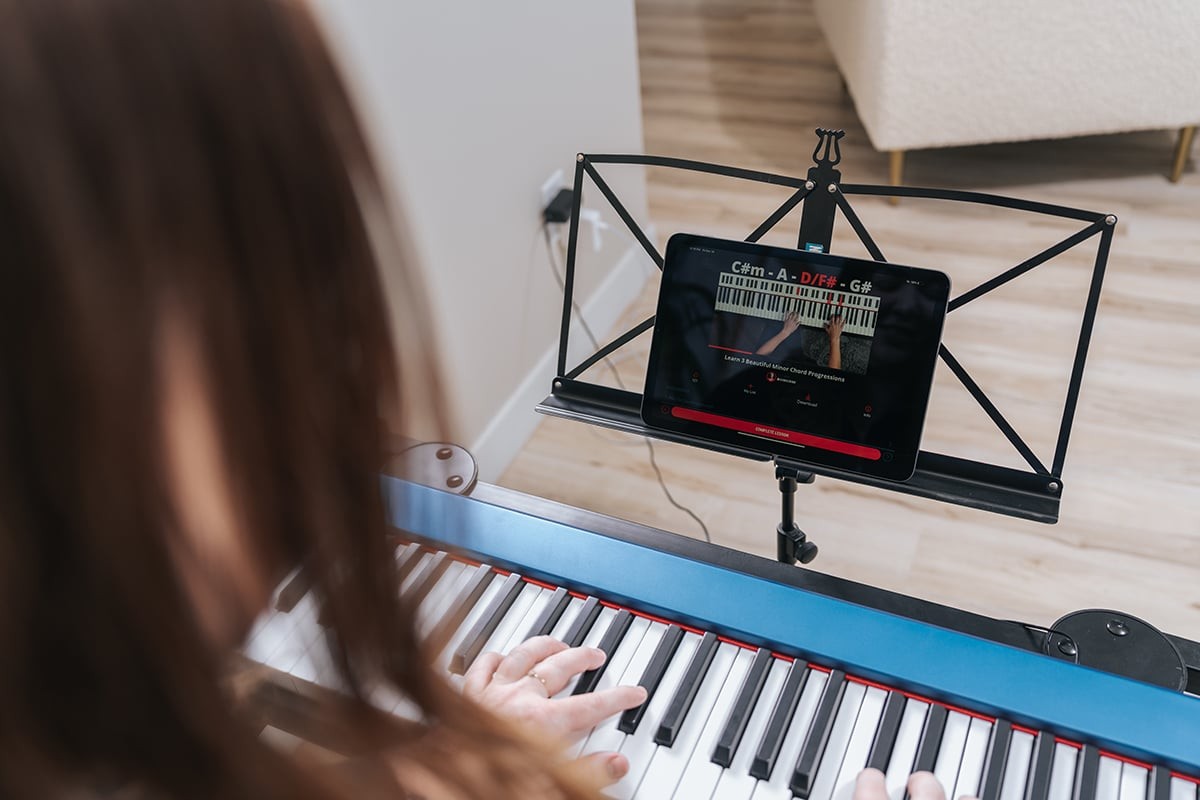Is learning the piano difficult? Discover the truth about the challenges and rewards of playing the piano, and how LEARNS.EDU.VN can help you succeed. This guide explores the complexities of piano learning, from mastering hand independence to understanding music theory, offering solutions and support for aspiring musicians. Dive in to unlock your musical potential with practical tips and resources.
1. Understanding the Piano Learning Curve
Many aspiring musicians wonder, “How Hard Is It To Learn The Piano?” The answer is multifaceted. While the piano is often considered one of the more accessible instruments for beginners, mastering it requires dedication, time, and a strategic approach. Let’s break down the elements that contribute to the piano’s unique learning curve.
1.1 Initial Accessibility: The Beginner’s Advantage
The piano is relatively straightforward for novices. Unlike instruments that require specific embouchures or intricate finger placements to produce a sound, the piano allows you to create pleasing notes simply by pressing keys. This immediate gratification can be highly motivating for beginners.
- Simple Sound Production: No need for complex techniques to produce a note.
- Visual Layout: The linear arrangement of notes from low to high pitch makes understanding musical relationships easier.
- Immediate Feedback: Instant sound response helps in learning and correcting mistakes quickly.
1.2 The Ascent to Mastery: The Real Challenge
While starting on the piano might be easy, achieving proficiency is another story. The piano demands a high level of coordination, theoretical knowledge, and practice.
- Hand Independence: Coordinating both hands to play different rhythms and melodies simultaneously is a significant hurdle.
- Advanced Techniques: Mastering complex pieces requires advanced techniques like scales, arpeggios, and intricate finger exercises.
- Musical Expression: Beyond just playing the notes, conveying emotion and musicality adds a deeper layer of complexity.
2. Key Challenges in Learning Piano
Several factors make learning the piano challenging. These include developing hand independence, reading music notation, understanding music theory, accessibility to quality instruments, and consistent practice. Let’s delve into each of these areas to understand the difficulties and how to overcome them.
2.1 Hand Independence: The Coordination Conundrum
One of the most significant challenges for beginners is coordinating both hands. Playing different rhythms and melodies simultaneously requires practice and patience.
- Difficulty: The brain must learn to control each hand independently, which feels unnatural at first.
- Solution: Start with simple exercises, practicing each hand separately before combining them. Gradual integration is key.
- LEARNS.EDU.VN Tip: Find targeted hand independence exercises on our site to boost your coordination.
2.2 Reading Sheet Music: Decoding the Language of Music
Sheet music is the written language of music, and learning to read it can be daunting. Piano players must learn both treble and bass clef, adding another layer of complexity.
- Difficulty: Understanding notes, rhythms, and musical symbols can be overwhelming.
- Solution: Start with basic notation, focusing on recognizing notes and simple rhythms. Gradually introduce more complex elements.
- LEARNS.EDU.VN Tip: Explore our comprehensive guide to reading music notation, available on our website.
2.3 Music Theory: Unlocking the Structure of Music
Music theory provides the framework for understanding how music works. It involves learning about chords, scales, harmonies, and musical forms.
- Difficulty: Grasping abstract concepts and applying them to your playing can be challenging.
- Solution: Begin with basic concepts, such as intervals and chords. Use the piano keyboard as a visual aid to understand these concepts.
- LEARNS.EDU.VN Tip: Access our library of music theory resources designed specifically for piano players.
2.4 Accessibility: Overcoming Barriers to Entry
Pianos can be expensive, and learning on a quality instrument is essential. Full-size, 88-key keyboards with weighted keys are ideal but not always accessible to everyone.
- Difficulty: Affording and finding space for a piano can be a significant barrier.
- Solution: Consider digital pianos with weighted keys as a more affordable and space-saving alternative.
- LEARNS.EDU.VN Tip: Check out our recommendations for beginner-friendly digital pianos that offer excellent value.
2.5 Practice: The Cornerstone of Progress
Consistent practice is crucial for improving your piano skills. However, finding the time and maintaining motivation can be difficult.
- Difficulty: Balancing practice with other commitments and staying motivated through challenges.
- Solution: Set realistic goals, create a structured practice schedule, and focus on enjoying the process.
- LEARNS.EDU.VN Tip: Join our community forum to share your progress and stay motivated with fellow piano learners.
3. Maximizing Your Learning Potential
To make learning the piano easier, consider these strategies: playing music you enjoy, exploring different learning methods, using a piano with weighted keys, and cultivating good practice habits.
3.1 Play Music You Love: Fueling Your Passion
Choosing music you are passionate about can make the learning process more enjoyable and motivating.
- Benefit: Playing songs you love keeps you engaged and eager to practice.
- Strategy: Focus on skills that help you master your favorite songs, such as chord symbols or singing while playing.
- LEARNS.EDU.VN Tip: Discover a wide range of sheet music and tutorials for various genres on our platform.
3.2 Explore Various Learning Methods: Find What Works
Different learning methods suit different individuals. Experiment with various approaches to find the one that resonates with you.
- Benefit: Discover the teaching style that best fits your learning preferences.
- Strategy: Try online courses, in-person lessons, books, and YouTube tutorials. Stick with a method for a reasonable period before switching.
- LEARNS.EDU.VN Tip: Our platform offers a diverse range of learning resources to cater to different learning styles.
3.3 Learn on a Piano With Weighted Keys: Developing Proper Technique
Using a piano with weighted keys helps you develop proper technique from the start.
- Benefit: Weighted keys mimic the feel of an acoustic piano, enhancing your control over dynamics and expression.
- Strategy: Invest in a digital piano with weighted keys if an acoustic piano is not feasible.
- LEARNS.EDU.VN Tip: Consult our buying guide for recommendations on affordable digital pianos with excellent weighted action.
3.4 Cultivate Good Practice Habits: Stay Consistent
Establishing good practice habits is essential for continuous improvement.
- Benefit: Consistent practice leads to steady progress and helps maintain motivation.
- Strategy: Practice regularly, set S.M.A.R.T. goals, and reconnect with your “why” to stay motivated.
- LEARNS.EDU.VN Tip: Utilize our practice tracking tools to monitor your progress and stay on track.
4. Is Learning Piano Hard? Overcoming Common Hurdles
4.1. Breaking Down Complex Tasks
Learning piano is a journey filled with incremental steps. Breaking down complex tasks into smaller, manageable goals can make the process seem less daunting. For example, instead of trying to learn an entire sonata at once, focus on mastering one measure or phrase at a time.
- Task: Learning a complex piece
- Action: Divide the piece into smaller sections
- Benefit: Makes the piece more manageable and less overwhelming
4.2. The Role of Patience and Persistence
Patience and persistence are crucial when learning any new skill, and piano is no exception. There will be times when progress feels slow or nonexistent, but it’s important to remember that every practice session contributes to your overall development.
- Challenge: Slow progress
- Strategy: Maintain consistent practice and celebrate small victories
- Result: Steady improvement over time
4.3. Embracing Imperfection
Perfectionism can be a significant obstacle to learning. It’s important to embrace imperfections and view mistakes as opportunities for growth.
- Mindset: Striving for perfection
- Adjustment: Accepting mistakes as part of the learning process
- Outcome: Reduced stress and increased enjoyment
5. Time Investment: How Long Does It Take to Learn Piano?
5.1. Factors Influencing Learning Time
The time it takes to learn piano varies greatly depending on individual factors such as natural aptitude, practice habits, and learning goals.
- Aptitude: Natural musical ability
- Practice: Consistent, focused practice
- Goals: Desired skill level (beginner, intermediate, advanced)
5.2. Realistic Expectations
Setting realistic expectations is crucial for maintaining motivation and avoiding disappointment. It’s important to understand that mastering the piano is a long-term endeavor that requires consistent effort and dedication.
- Beginner Level: Achieving basic skills and playing simple songs may take several months of regular practice.
- Intermediate Level: Developing more advanced techniques and playing intermediate-level pieces can take one to two years.
- Advanced Level: Reaching a high level of proficiency and performing complex repertoire may require several years of dedicated study.
5.3. The Value of Consistent Effort
Consistency is more important than the amount of time spent practicing in any single session. Regular, focused practice, even in short bursts, is more effective than sporadic, lengthy sessions.
- Strategy: Practice for at least 30 minutes most days of the week
- Benefit: Consistent progress and skill development
- Result: Maintaining motivation
6. Dispelling Common Myths About Learning Piano
6.1. Myth: You Need to Start Young
One common myth is that you need to start learning piano at a young age to achieve proficiency. While early exposure to music can be beneficial, it’s never too late to start learning.
- Reality: Adults can learn piano just as effectively as children, provided they have the motivation and dedication.
- Advantage: Adults may have a better understanding of music theory and more disciplined practice habits.
6.2. Myth: You Need Natural Talent
Another myth is that you need natural talent to become a good piano player. While some individuals may have a natural aptitude for music, anyone can learn to play the piano with consistent practice and the right guidance.
- Reality: Dedication and hard work are more important than innate talent.
- Focus: Emphasize skill development and consistent practice.
6.3. Myth: You Need an Expensive Piano
Many people believe that you need an expensive piano to learn effectively. While a high-quality instrument can be beneficial, it’s not essential for beginners.
- Reality: Digital pianos with weighted keys offer a more affordable and practical option for beginners.
- Alternative: Focus on finding an instrument that provides a realistic playing experience.
7. Incorporating Technology into Piano Learning
7.1. Apps for Piano Learning
Numerous apps are available to assist with piano learning, offering features such as interactive lessons, sheet music libraries, and practice tracking tools.
| App Name | Features | Benefits |
|---|---|---|
| Flowkey | Interactive lessons, song library, real-time feedback | Engaging learning experience, immediate feedback on performance |
| Simply Piano | Step-by-step lessons, personalized practice plans | Structured learning, tailored to individual skill levels |
| Piano Maestro | Gamified lessons, extensive music library | Fun and motivating, wide range of musical selections |
| Perfect Piano (Mobile) | Keyboard simulations, practice modes, online multiplayer | Portable practice, collaboration with other musicians, suitable for various skill levels |
| Skoove | Interactive courses, personalized feedback, wide variety of music genres | Structured learning paths, focused feedback, diverse musical content |









7.2. Online Resources
Online resources such as video tutorials, sheet music websites, and online communities can provide valuable support and guidance for piano learners.
- Video Tutorials: Platforms like YouTube offer a wealth of free piano tutorials covering various topics and skill levels.
- Sheet Music Websites: Websites like Musicnotes and IMSLP provide access to a vast library of sheet music for all genres and skill levels.
- Online Communities: Forums and social media groups allow piano learners to connect with others, share tips, and ask questions.
7.3. Leveraging AI
AI-powered piano learning tools can provide personalized feedback and guidance, helping learners identify areas for improvement and track their progress.
- AI Feedback: Analyzes your playing and provides real-time feedback on accuracy, timing, and expression.
- Personalized Learning: Adapts to your individual skill level and learning style, providing customized lessons and practice plans.
- Progress Tracking: Monitors your progress and provides insights into your strengths and weaknesses.
8. The Social Aspect of Learning Piano
8.1. Benefits of Group Lessons
Group lessons offer a supportive and collaborative learning environment, allowing students to learn from each other and stay motivated.
- Peer Support: Learning alongside others can provide encouragement and motivation.
- Collaborative Learning: Sharing tips and strategies with fellow students can enhance your understanding.
- Performance Opportunities: Group lessons may include opportunities to perform together, building confidence and teamwork skills.
8.2. Joining a Community
Joining a piano community, whether online or in person, can provide valuable support, encouragement, and opportunities for collaboration.
- Online Forums: Connect with other piano learners, ask questions, and share your progress.
- Local Music Groups: Participate in local music groups or ensembles to play with others and build your performance skills.
- Social Media: Join social media groups dedicated to piano learning to connect with others and share your experiences.
8.3. Performing for Others
Performing for others, whether in a formal recital or an informal setting, can be a rewarding and motivating experience.
- Performance Goals: Set goals to perform for others to give yourself something to work toward.
- Confidence Building: Performing can help build confidence and overcome stage fright.
- Sharing Your Passion: Sharing your music with others can be a deeply fulfilling experience.
9. Expert Opinions on Piano Learning Difficulty
9.1. Insights from Piano Teachers
Piano teachers offer valuable insights into the challenges and rewards of learning piano, drawing on their experience working with students of all ages and skill levels.
- Individualized Approach: Emphasizing the importance of tailoring instruction to each student’s individual needs and learning style.
- Patience and Persistence: Highlighting the role of patience and persistence in overcoming challenges and achieving progress.
- Enjoyment: Stressing the importance of finding enjoyment in the learning process and making music a part of your life.
9.2. Perspectives from Professional Pianists
Professional pianists share their perspectives on the dedication and hard work required to reach a high level of proficiency, as well as the profound rewards of making music.
- Lifelong Learning: Emphasizing that learning piano is a lifelong journey, with endless opportunities for growth and discovery.
- Discipline and Dedication: Highlighting the importance of discipline and dedication in honing your skills and achieving your goals.
- Emotional Connection: Stressing the importance of connecting with the music on an emotional level and using your playing to express yourself.
9.3. Research Findings
Research studies on music learning provide evidence-based insights into the cognitive and emotional benefits of playing the piano, as well as effective strategies for improving your skills.
- Cognitive Benefits: Studies have shown that learning piano can improve cognitive functions such as memory, attention, and problem-solving skills.
- Emotional Well-being: Playing piano can reduce stress, improve mood, and enhance overall well-being.
- Effective Strategies: Research has identified effective strategies for improving your piano skills, such as spaced repetition, active recall, and deliberate practice.
10. Is Piano Hard to Learn? FAQs
10.1. What are the most common challenges for beginners?
- Answer: Common challenges include hand independence, reading sheet music, and understanding music theory.
10.2. How long does it take to become proficient?
- Answer: Proficiency varies, but most people can play simple songs within a few months of regular practice.
10.3. Is it easier to learn piano as a child or an adult?
- Answer: Both have advantages. Children may learn faster initially, but adults often have more discipline and focus.
10.4. What type of piano should a beginner buy?
- Answer: A digital piano with weighted keys is a great option for beginners due to its affordability and practicality.
10.5. How much practice is needed per week?
- Answer: Aim for at least 30 minutes of practice most days of the week for consistent progress.
10.6. Can I learn piano without a teacher?
- Answer: Yes, but a teacher can provide personalized guidance and accelerate your learning.
10.7. What are some good online resources for learning piano?
- Answer: Websites like LEARNS.EDU.VN, YouTube tutorials, and apps like Flowkey offer valuable learning resources.
10.8. How can I stay motivated while learning piano?
- Answer: Set realistic goals, play music you enjoy, and join a community of fellow learners.
10.9. What if I don’t have a natural talent for music?
- Answer: Talent is less important than dedication and consistent practice. Anyone can learn with effort.
10.10. Is music theory essential for learning piano?
- Answer: While not mandatory, understanding music theory enhances your comprehension and playing ability.
11. Conclusion: Embracing the Journey with LEARNS.EDU.VN
Learning the piano is a rewarding journey that combines challenges and triumphs. While it requires dedication, patience, and consistent effort, the joy of creating music makes it all worthwhile. Remember to set realistic goals, practice regularly, and celebrate your progress along the way.
Whether you’re just starting or looking to improve your skills, LEARNS.EDU.VN is here to support you every step of the way. Explore our comprehensive resources, connect with our community, and unlock your musical potential.
Ready to embark on your piano-learning adventure? Visit LEARNS.EDU.VN today to discover a wealth of courses, tutorials, and resources designed to help you succeed.
- Address: 123 Education Way, Learnville, CA 90210, United States
- WhatsApp: +1 555-555-1212
- Website: LEARNS.EDU.VN
Join the learns.edu.vn community and start playing the music you love!
